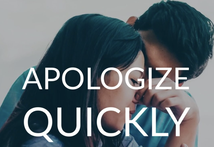|
|
Lead with Relief
| ||||||
| Repair Process | |
| File Size: | 63 kb |
| File Type: | |

When you hurt your partner you must relieve that distress as soon as possible. Distress is defined as hurt, pain, sadness, frustration, shame and even anger.
There are three mistakes people make that prevents an apology from happening:
There are three mistakes people make that prevents an apology from happening:
- You don't think you did anything wrong. Chances are you didn't necessarily do anything wrong and yet you hurt your partner.
- You didn't mean to hurt your partner. It is rare that we intentionally cause pain to our partner. So if you only apologize when we hurt them intentionally, you won't be apologizing much. It's as if you are saying, "I didn't mean to hurt you so you shouldn't feel hurt."
- You explain why you did what you did that caused the hurt, thinking that if you have a good explanation it will relieve the pain.
When your partner is hurt and they ARE able to tell you how they feel in a non-threatening way.
- “It hurts when you talk to me that way.”
- “That didn’t feel very good”
- Even better, “I know you didn’t mean it but….”
You may feel shame that your partner is in distress and you don’t know how to take responsibility without being overcome with self-blame. Your focus turns to how you can never be good enough for your partner and then they find themselves taking care of you rather than you repairing the hurt you caused. You must develop some shame resilience so you can relieve the pain of your partner. There is no shame in feeling shame but if you stay there you won't be able to repair. Explore where it comes from.
When your partner is hurt and they ARE NOT able to tell you how they feel, they may either withdraw or attack.
- “How many times do I have to tell you not to __________”
- “What is wrong with you? You are so ___________!
- “I just need to get away from you. I’m leaving!”
|
If they withdraw and give you the silent treatment or pretend nothing is wrong do not do nothing in return. You must pursue your partner and find out what is going on so you can relieve the distress. Be curious and ask them how you hurt them.
|
If they attack your character and call names you may get triggered and attack in return or withdraw. Try not to take it personally and to see the reaction as pain and be curious about how you triggered the reaction.
|
The Path to Relief

As soon as distress emerges, get curious about what caused the distress. Explore their experience until it makes sense to you why they got hurt by what you did or said, or what you didn't do or say. Once you understand, then you apologize. An apology is a positive way to show your love. An apology is meant to repair damage done to a trusting relationship by acknowledging pain caused, accepting responsibility, and expressing sincere regret at having done something hurtful to a person you care about. You don’t assess whether you did anything wrong; you relieve the pain.
|
HOW TO REPAIR
|
HOW NOT TO REPAIR
|